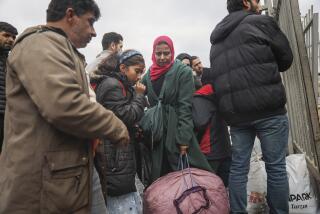Turkey Tries to Rally Opposition to Armenia : Conflict: Leader is defensive about why he isn’t helping Azerbaijan more. He condemns Karabakh campaign.
- Share via
MOSCOW — Embarrassed by its inability to help Azerbaijan, its closest neighbor among the Islamic, Turkic-speaking nations emerging from the Soviet Union, Turkey said Tuesday that it will try to mobilize international opinion against Armenia and thus reverse the gains of the recent offensive in the undeclared war with Azerbaijan.
Prime Minister Suleyman Demirel, completing two days of talks with Russian leaders, said the world should be outraged by an Armenian campaign that drove virtually all Azerbaijani villagers from Nagorno-Karabakh, a predominantly Armenian enclave in Azerbaijan that has long been in dispute, and that then opened a corridor through Azerbaijani territory to Armenia.
“Azerbaijani villages and territory are now being emptied by the Armenians,” Demirel charged, describing “Armenian aggression” as “self-evident and very clear.”
“In this new era, every country should pay attention to international public opinion . . . and not just do what it wants,” he said.
But Demirel--on the defensive with questions from journalists from the Turkic-speaking areas of the former Soviet Union on why his country is not doing more to help the Azerbaijanis--said Turkey could only press for negotiations to end the escalating conflict between Azerbaijan and Armenia.
“There will be no such thing as Turkish military intervention,” Demirel told a press conference, dismissing reports from Russian military officials that Turkey was massing troops along the Armenian and Azerbaijani borders. “Turkey and Russia will take measures toward peacekeeping and mediation with the goal of ending the bloodshed in the region.”
After working in recent months to establish Turkey as the leading power of the emerging Islamic bloc across Central and Southwest Asia, Demirel is clearly frustrated by his country’s inability to assist Azerbaijan, first in Nagorno-Karabakh and now in the new conflict in Nakhichevan, an Azerbaijani enclave in Armenia.
“The world community should address these issues in earnest,” Demirel said, declaring Turkey’s intention to move at the United Nations and within the Conference on Security and Cooperation in Europe to have the Armenian actions in Nagorno-Karabakh declared illegal.
Demirel was also pressed, however, on what Turkey intends to do for the other Turkic peoples in the former Soviet Union, many of whom were deported from their traditional homelands before and after World War II. On this, he said he had had no discussions with Russian President Boris N. Yeltsin.
Turkey’s broad intentions in Central Asia and the other Turkic-speaking regions of the former Soviet Union, he said, are to foster democracy and economic development and encourage “national self-assertion.”
“After the collapse of the Soviet Union, the unstable situation in this region became critical for us as a neighboring country,” Demirel said, explaining Turkey’s diplomatic push across the Caucasus region and through Central Asia.
“We are not seeking to expand the size of our population, nor are we competing with anyone. Those countries where the population are Turks who speak languages similar to ours should be strong, firm on their feet. . . . The steps that lead us toward one another should not affect any third parties.”
Although Demirel and Yeltsin discussed the improvement of relations between Turkey and Russia, including a fivefold increase in trade to $10 billion a year, the Armenian-Azerbaijani conflict clearly dominated their talks.
The Azerbaijani news agency Turan said an Armenian militia group had attacked the village of Gyulaburd overnight; it claimed that 14 Armenians and 2 Azerbaijanis died.
The Armenian news agency Snark, meanwhile, said that Azerbaijani forces had rocketed the towns of Mardakert, Karachinar and Manashid in Nagorno-Karabakh, killing two people.
Azerbaijani officials are now complaining of Armenian attacks on Nakhichevan, a region that is formally part of Azerbaijan although within Armenia and on the borders of Iran and Turkey.
Under a 70-year-old treaty with “Bolshevik Russia,” Turkey has the right to “protect” the people of Nakhichevan. Over the weekend, Turgut Ozal, Turkey’s president, called for the dispatch of Turkish troops to the region, but Demirel refused.
More to Read
Sign up for Essential California
The most important California stories and recommendations in your inbox every morning.
You may occasionally receive promotional content from the Los Angeles Times.













